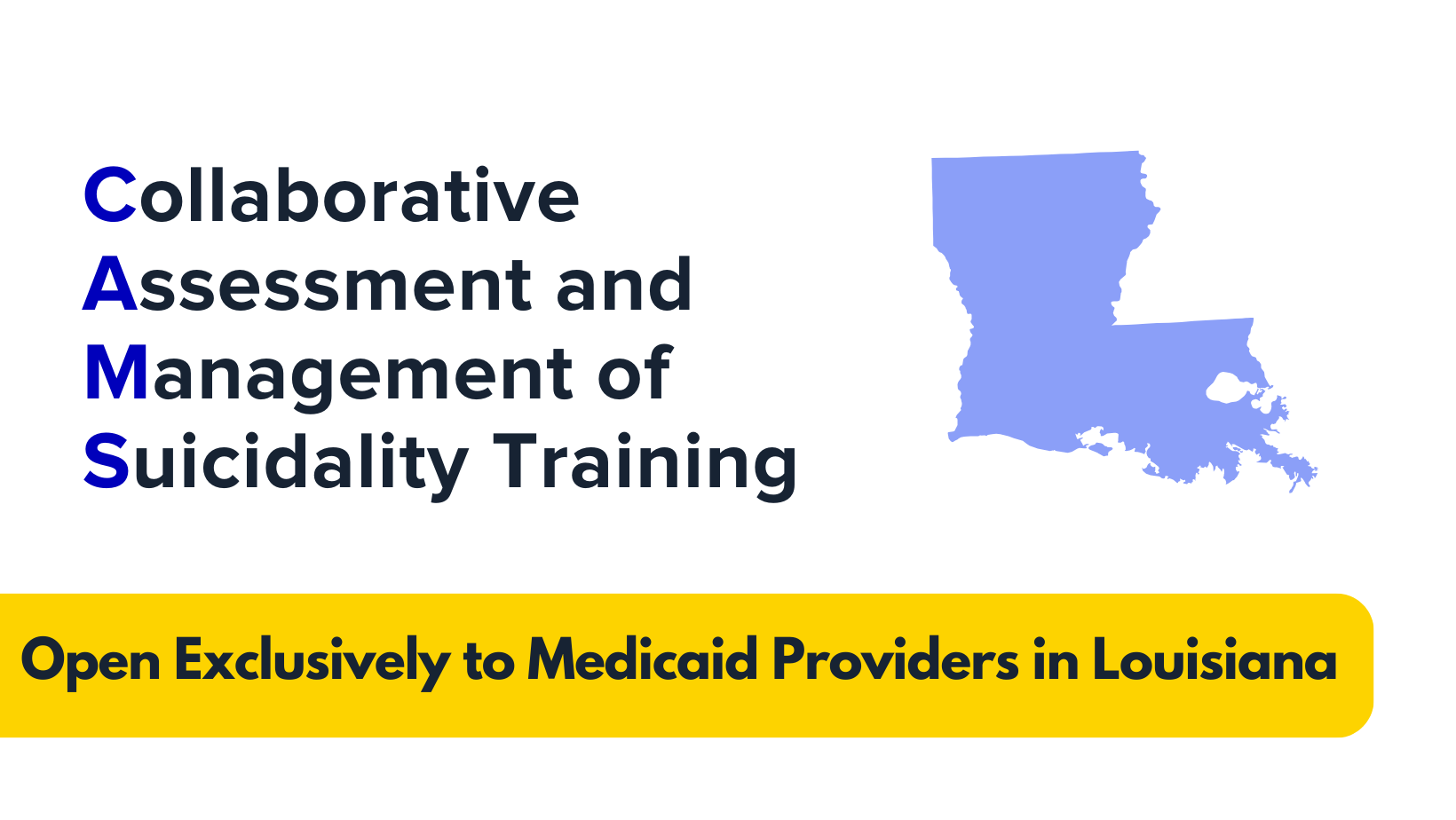Collaborative Assessment and Management of Suicidality (CAMS) Training

Collaborative Assessment and Management of Suicidality (CAMS) Training

Presented By
-
 Raymond P Tucker, Ph.D.More Info
Raymond P Tucker, Ph.D.More Info
Brought to You By
Dates and Times
-
-Live Webinar
-
-Live Webinar
Location
-
Live WebinarAccess virtually on TPN.health
This two-day training is intended to enrich the clinical and service capacity of behavioral health providers in the treatment of persons with IDD/MH dual diagnosis. An IDD/MH dual diagnosis refers to individuals with an intellectual/developmental disability (IDD) who concurrently experience a mental health condition.This training will provide a foundational overview of IDD/MH dual diagnosis, including recognized clinical best practice information. Individual sections and learning objectives will be included for each of NADD’s Dual Diagnosis Clinical Competencies: Positive Behavior Support & Effective Environments; Psychotherapy & Other Therapeutic Interventions; Psychopharmacology; Assessment of Medical Issues; and Clinical Assessment. The trainers will also provide a roadmap to NADD Dual Diagnosis Clinical Certification Credentialing.
- • Counselors
- • Addiction Counselors
- • Social Workers
- • Licensed Marriage and Family Therapists
- • Psychologists
At the end of this course, participants will be able to:
-
Identify how U.S. suicide rates differ by demographics.
-
Discuss contemporary models of why people die by suicide.
-
Identify 3 critical risk factors to consider when conceptualizing suicide risk.
-
Identify 2 common suicide risk screening tools.
-
Identify 2 common suicide risk assessment tools.
-
Describe the difference between suicide risk management and treatment tools.
-
Summarize the 4 tenets of the CAMS philosophy.
-
Develop a CAMS Stabilization Plan.
-
Identify 5 risk factors associated with suicidal thoughts, feelings, and behaviors.
-
Utilize assessment skills to complete a collaborative suicide risk assessment.
-
Complete a Suicide Status Form (SSF) in role play sessions.
-
Apply suicide focused treatment skills.
-
Complete a CAMS Therapeutic Worksheet (CTW).
TPN.health has been approved by NBCC as an Approved Continuing Education Provider, ACEP No. 7267. Programs that do not qualify for NBCC credit are clearly identified. TPN.health is solely responsible for all aspects of the programs.
Course meets the qualifications for hours of continuing education credit for LPCCs as required by the California Board of Behavioral Sciences. TPN.health is approved by the California Association of Marriage and Family Therapists to sponsor continuing education for LPCCs. TPN.health maintains responsibility for this program/course and its content.
Trusted Provider Network, LLC is recognized by the New York State Education Department’s State Board for Mental Health Practitioners as an approved provider of continuing education for licensed mental health counselors. #MHC-0220.
This course has been approved by TPN.health, as a NAADAC Approved Education Provider, for educational credits. NAADAC Provider #198061, TPN.health is responsible for all aspects of the programming. Counselor Skill Group: Legal, Ethical and Professional Development.
TPN.health, #1766, is approved to offer social work continuing education by the Association of Social Work Boards (ASWB) Approved Continuing Education (ACE) program. Organizations, not individual courses, are approved as ACE providers. State and provincial regulatory boards have the final authority to determine whether an individual course may be accepted for continuing education credit. TPN.health maintains responsibility for this course. ACE provider approval period: 03/31/2022 – 03/31/2025. Social workers completing this course receive 14 continuing education credits.
Course meets the qualifications for hours of continuing education credit for LCSWs as required by the California Board of Behavioral Sciences. TPN.health is approved by the California Association of Marriage and Family Therapists to sponsor continuing education for LCSWs. TPN.health maintains responsibility for this program/course and its content.
Trusted Provider Network, LLC is recognized by the New York State Education Department’s State Board for Social Work as an approved provider of continuing education for licensed social workers #SW-0654.
Course meets the qualifications for hours of continuing education credit for LCSWs as required by the California Board of Behavioral Sciences. TPN.health is approved by the California Association of Marriage and Family Therapists to sponsor continuing education for LMFTs. TPN.health maintains responsibility for this program/course and its content.
Trusted Provider Network, LLC is recognized by the New York State Education Department’s State Board for Mental Health Practitioners as an approved provider of continuing education for licensed marriage and family therapists #MFT-0097.
TPN.health is approved by the American Psychological Association to sponsor continuing education for psychologists. TPN.health maintains responsibility for this program and its content.
-
Collaborative Assessment and Management of Suicidality (CAMS) TrainingDay 1-Raymond P Tucker, Ph.D.Live Webinar
-
Collaborative Assessment and Management of Suicidality (CAMS) Training – Day 2Day 2-Raymond P Tucker, Ph.D.Live Webinar

